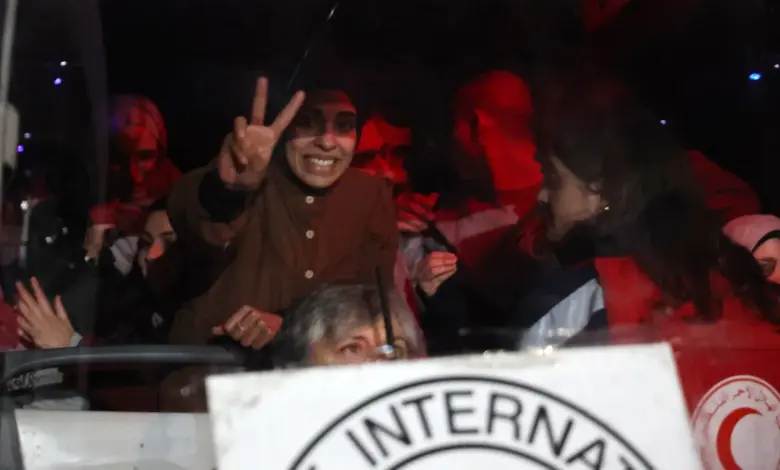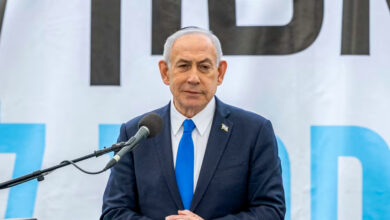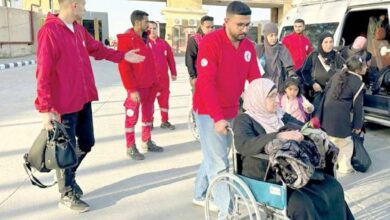
“This is not a victory for you. We have destroyed and killed in Gaza, in Yemen, in Syria, in Iran. We killed (your) leadership,” one, Rula Hassanein, recalled hearing in a 90-second Israeli propaganda video they were forced to watch on a large screen ahead of their release.
The women were part of a group of 90 Palestinian prisoners released in a ceasefire deal between Hamas and Israel. Around nine hours earlier, Hamas had freed three Israeli hostages in Gaza after 15 months of captivity.
Hassanein remembers the video vividly. The prisoners, she said, were made to watch it on loop for hours as Palestinians gathered outside to receive them.
“We were not allowed to look left or right. Only at the screen,” she told CNN. Two other released prisoners also told CNN that they were forced to watch the video.
In an interview with CNN from her home in the West Bank city of Bethlehem, Hassanein appeared frail and exhausted. Sitting in her living room, she was surrounded by family photos that had been her toddler’s only connection to her for the past 10 months. She had given birth to her first child just months before her arrest, in March 2024. Hassanein worked as a journalist for local media outlets.
Israeli authorities charged her with incitement on social media, she said.
According to the Committee to Protect Journalists (CPJ), court documents accused Hassanein of incitement over posts in 2022 and 2023, including reposts on X and Facebook “in which she commented on the Israel-Gaza war, that included her frustration over the suffering of Palestinians.”
In another post, Hassanein also “commented on events in the Israeli-occupied West Bank, including the shooting of two Israelis in the northern town of Huwara in August 2023 and the killing of an Israeli soldier at a checkpoint in East Jerusalem in October 2022,” the CPJ said in May.
Her account on X has been suspended and CNN hasn’t been able to access her posts.

Hassanein described her time in prison as filled with abuse and humiliation. She said she was strip searched and verbally abused by Israeli guards, calling the treatment “torture.”
“They would hold us by the head, even slip off large parts of our headscarves, pushing us down to our knees and dragging us while we are bound at our hands and feet with heavy metal irons,” she said.
CNN asked the Israel Prison Service (IPS), the country’s detention authority, about the allegations that prisoners were mistreated and made to watch a propaganda video. The IPS said it wasn’t aware of the allegations “and as far as we know, no such events have occurred under IPS responsibility.”
“Nonetheless, prisoners and detainees have the right to file a complaint that will be fully examined and addressed by official authorities,” it added.
Hamas is expected to release a total of 33 hostages from Gaza during the 42-day truce. Those released so far have not spoken publicly about their experience in captivity.
As of this month, Israel holds at least 10,000 Palestinian prisoners, according to the Commission of Detainees’ Affairs and the Palestinian Prisoners’ Society – though that number does not include an unknown number of Palestinians taken captive in Gaza. The figure of Palestinian prisoners held by Israel includes 3,376 people held under the controversial system of administrative detention, meaning they can remain in prison indefinitely with no public charges against them nor trial. It includes 95 children and 22 women.
A July report by the United Nations stated that detention conditions for Palestinians in Israeli custody “worsened dramatically” after October 7, 2023, when Hamas-led militants attacked southern Israel, killing 1,200 people and taking more than 250 hostages, prompting an Israeli offensive on Gaza that has killed more than 47,000 and injured over 100,000 people, according to the health ministry there.
“The Israeli authorities further restricted access to food, water, sanitation and electricity, medical treatment, media and information, family visits and consultation with legal representatives,” the report said. “According to the OHCHR monitoring, there have been regular, at times daily, raids of prison cells, removal of personal items, and limited access to personal hygiene items, including menstrual hygiene.”
‘My daughter forgot what I looked like’
Hassanein described dire conditions in the Israeli prison, where inmates were given little food and were regularly subjected to physical and verbal abuse.
Access to menstrual pads was sometimes at the mercy of male prison guards, she said.
“The guards in detention used to tell us we didn’t have to change our pads every hour, that we could change them every four to five hours,” Hassanein told CNN.
She recalled a woman from Gaza who wasn’t provided a menstrual pad. “We could see blood all over her clothes and she was mocked (by Israeli guards)… it was horrifying.”
Before her arrest, Hassanein had given birth to premature twins. One died hours after her caesarean section. The surviving child, Elia, appeared to have forgotten her mother while Hassanein was in prison.
A video of the mother and child’s reunion on Sunday went viral on social media.
Hassanein said she would often dream of her daughter in prison, but was dismayed when Elia didn’t recognize her initially. “Of course, my daughter forgot what I looked like,” she said.
“I saw her and I hugged her, but she was afraid,” she added. “I am trying, with my husband, to re-enter Elia’s life in a gradual manner, so as not to subject her to an emotional shock.”




